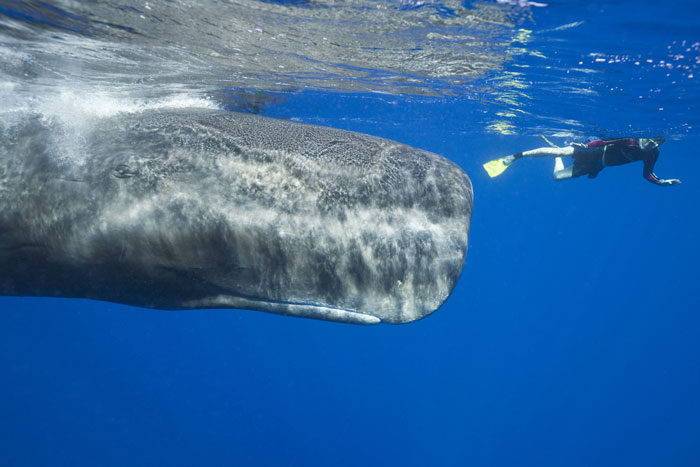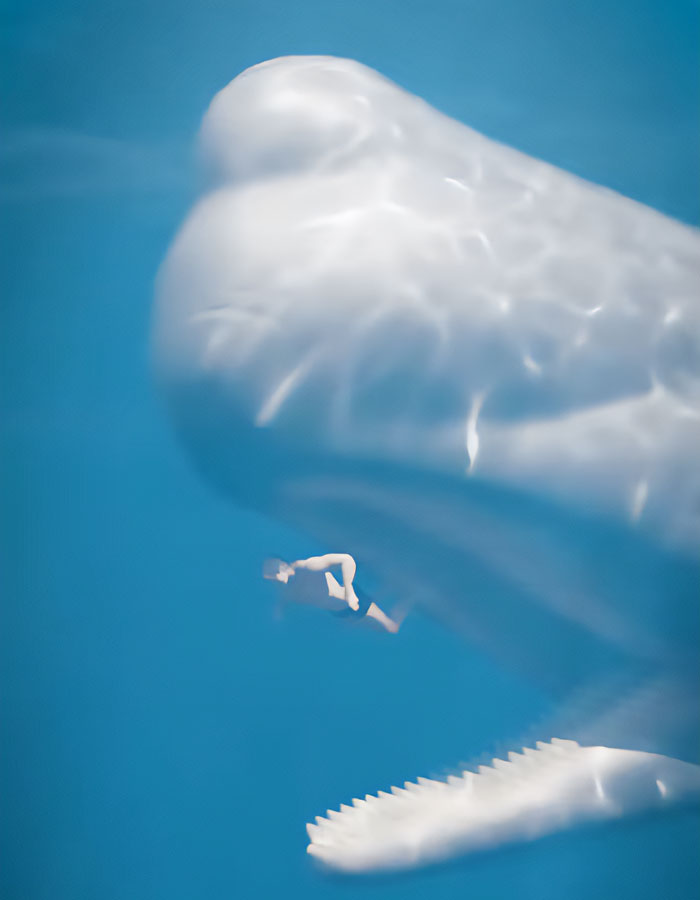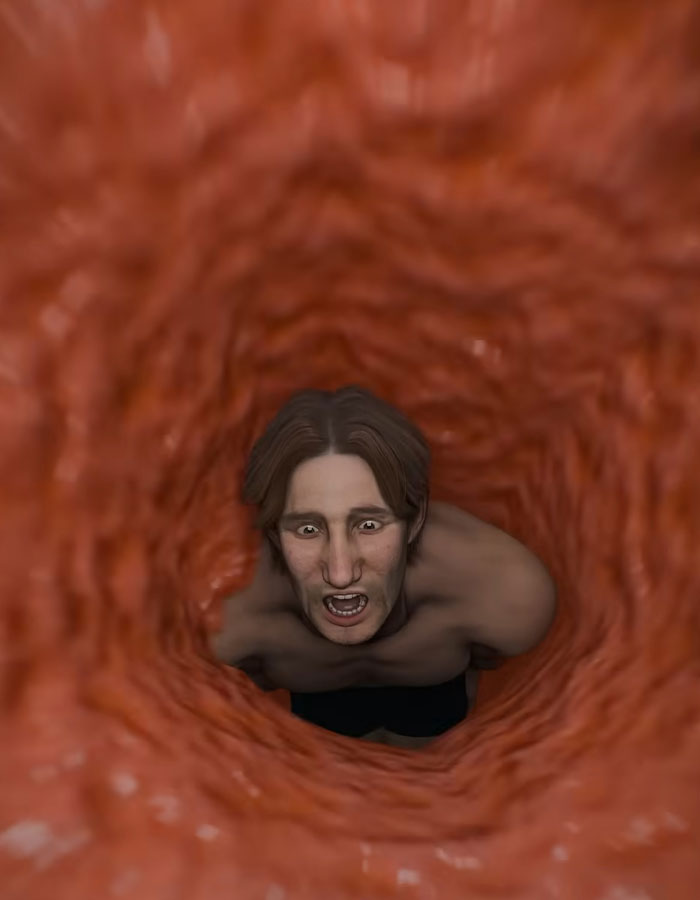The odds of being sucked into a whale’s mouth are one in a million. By nature, these mammals are very docile, and there has never been a true report of them eating a human.
But if, for some reason, a whale mistook a diver for an animal in their diet and swallowed them whole, the probability of survival would plummet to zero.
A video created by Zack D. Films explores the almost impossible situation, showing the reality of being digested alive.
The animated short was released one month ago but has already amassed more than 40 million views, with users imagining the “completely pitch black” scenario as terrifying.
A human would be killed almost immediately upon entering their digestive tract

Image credits: ullstein bild / Getty
After getting swallowed by a sperm whale, you’d immediately be compressed inside its massive throat and plunged into pitch-black darkness, according to the simulation video. Later, you’d pass through its esophagus.
Once you’ve made it past the narrow pathway, gravity would take you down into a series of one of four stomach chambers, based on the anatomy of a sperm whale. Depending on the species, the number of chambers varies, but either way, you wouldn’t make it out of the first one alive.
Digestive acids can be found in the mammal’s stomach chambers, and the moment a human’s skin comes into contact with it, their entire body will start to break down and their skin will burn.
And by some miracle, if you manage to avoid the acid, the lack of air inside the whale would quickly cause you to suffocate.
Scientifically speaking, a human would die within minutes and be digested like any other prey hunted by the sperm whale.
Anatomy-wise, only a sperm whale’s throat is big enough for a human to squeeze through

Image credits: Zack D. Films
The size of a whale’s throat varies, from the width of a basketball to a human fist, and most whales would not be able to swallow a person.
Under the right circumstances, however, the only species of whale that could swallow a human whole is the sperm whale.
With a regular diet of large prey, such as giant squid and octopus, their throats are relatively big. Although, this isn’t a cause for concern among humans.

Image credits: Zack D. Films
Sperm whales have one of the widest global distributions of any marine mammal species, spanning from the equator to the edges of the Arctic and Antarctica. And because they only frequent depths of 2,000 feet or below, the likelihood of a human encountering a sperm whale is zero to none.
From the surface, they’re most recognizable by their giant heads. They may not be the biggest mammals on Earth, but they have the largest brains, with an average of 7.8 kg of brain mass in males. For comparison, the mass of a humpback whale’s brain is about 4.6 kg.
A sperm whale’s head can represent a third of their total body length, which can be up to 60 feet long. Their blowholes are also located on a slight diagonal on the left side of their heads.
People started posing hypothetical questions after the widespread story of a 19th-century tale

Image credits: Zack D. Films
In 1891, James Bartley of St. Louis, Missouri, came back home with a sensational story to tell.
According to the news reports at the time, Bartley was a young sailor who was swallowed by a sperm whale. The next day, the same whale was killed, and his belly was cut open. Bartley popped out, blind and injured by corrosive stomach acid but miraculously alive.
This alleged incident unfolded in February 1891 about two hundred miles east of the Falkland Islands in the South Atlantic Ocean.
A whaling ship named Star of the East was on the lookout when a sperm whale was spotted about 3 miles away. The ship lowered two small boats, which later began to race with the whale.
When one of the crew leaned over to drive a weapon into the whale, it started thrashing, which sent the passengers on the smaller boats into the water. As the crew later looked to rescue the sailors, Bartley was missing.
After killing the whale and discovering that something was moving inside the mammal’s stomach, they cut the organ open, only to find Bartley, who had been inside for 15 hours. His skin was bleached a deathly white from its digestive juices, and the sailor was blind and had lost most of his hair.
But the young sailor had survived — something that should have been physically impossible.
Scientifically and historically, there isn’t an ounce of truth behind the tale

Image credits: Zack D. Films
While Bartley’s story was widely accepted and talked about, it may just be a made-up myth. According to Amusing Planet, Historian Edward B. Davis said that while there was a British ship by the name of Star of the East, it wasn’t near the Falklands at the time of the incident, and there was certainly no James Bartley on its crew.
With the lack of air inside a whale’s body and its corrosive gastric acid, there is no way James Bartley, now referred to as “Modern Day Jonah,” could have made it out alive.
The Eden Killer Whale Museum in New South Wales has added, as accounted by Bartley’s story, that a sperm whale inhales deeply before diving, storing oxygen in its body. This raised the question: “Could it be that James Bartley survived through the storing up of oxygen?”
The answer is no. But if the museum believed it a possibility for 100 years, then it’s no surprise the media did, too.
Social media users either mentioned the old tale or joked that this information was very helpful

Image credits: Zack D. Films
The Internet community was quick to comment on the absurdity of the scenario.
One comment said, “I’m glad people are using technology to answer the important questions,” while another joked, “Going on past experiences, it’s nothing like this.”
Others mentioned James Bartley by his biblical name.
“FYI Jonah was swallowed by a fish. We don’t know the species. And for all we know, God could have created it specifically to be able to hold someone in its belly without harming it,” a user said.
Users online joked about the unlikeliness of this situation
























 English (US) ·
English (US) ·